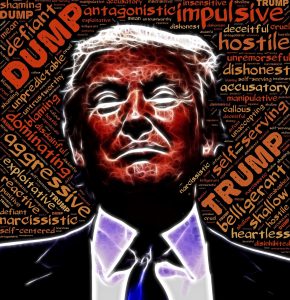The Politics of Hate in the 2016 US Presidential Election
Editor’s Note: This piece has been published concurrently in the KCL Dialogue.
Hatred in US politics is nothing out of the ordinary. Founded and populated by immigrants of just about any other country, the United States has always dealt with racial and ethnic tensions. Throughout its history, American politicians used and were inspired by these tensions to achieve their political goals: from the Know Nothing party in the 1850s, to southern segregationists in the 1960s, to the so-called “birthers” of the 2010’s. In this context, the 2016 US presidential election doesn’t differ from previous elections as to its usage of racial and cultural resentment. Its main difference however – besides the fact it’s not the 19th century anymore – is the fact that for the first time in modern history, a national figure doesn’t subtly use these social strains (the de facto technique), but publicly promotes them.
To compare the usage of hatred in Clinton’s campaign with that of Trump’s is a prime example of false equivalency. Bar from a ninth of September quote where she said that “half of Trump supporters can be put in a basket of deplorables”, Hillary Clinton has not encouraged nor tapped into the populist anger of the American electorate. In fact, she has found herself on the receiving side of it. Trump however, has called for a ban on Muslims coming in the country, has dubbed Mexican immigrants as rapists, has questioned the legitimacy of the first black president and has suggested people take up arms in case of a Clinton win. However, analysing hatred in this presidential election and precisely in Trump’s campaign is impossible without identifying it in the larger trend within the conservative movement. The Republican Party for decades has stirred up paranoia and hatred in order to win elections. That is why to outsiders of American politics, the election of someone like Trump makes no sense. But if one sees his nomination from the hate-filled lenses of many of his followers, he is the only candidate that makes sense.
PHOTO CREDIT: Mary Phalke/ Pixabay
Hate In Conservative Politics
Research shows that online content is more likely to become viral if it makes us angry. The same applies to politics. Politicians are keen to exploit and instill anger in their electoral base because research shows that not only does it drive people to the polls, it makes them seek less information on their candidate and not base their vote primarily on policy. It’s no wonder then that for the past eight years of a Democrat in the White House, the conservative movement in the United States has been kept in a perpetual state of hatred. Whilst there are various legitimate reasons to be angry about the state of affairs in the country, there exists an alternative world of conservative news in which the United States is on the brink of destruction. In that world, the country is run by a secret Muslim. Latin American immigrants are pouring in from the borders. The federal government is an inch away from taking the constitutionally guaranteed guns of its citizens. Hillary Clinton is a murderer. And last but not least, the “liberals” and the Democratic Party want to destroy America. All these claims are not found just in fringe websites that no one reads. They live and breathe in the US congress. They are either not denied or accepted by mainstream Republican leaders. They are not the result of outside influencers of unfortunate ideas that some people might happen to believe. They are a direct result of a political establishment that has realised it can keep winning in local, state and governorship elections by keeping its base in constant fear of the other side.
Indeed, hatred is not found just in nativist sentiment and resentment for foreigners. It can and is being used on compatriots. The opposition ceases to be the opposition, but instead becomes the enemy. The Democratic Party ceases to be the party that wants to regulate guns, it becomes the party that wants to take your guns away. It ceases to be the party of immigration reform, it becomes that of “amnesty”. They are not pro-choice, they are the party of “baby killers.” The result is that Partisan antipathy and party consistency has risen in the United States, and so has political polarization.
Whilst this strategy might have served to win over local races, it has flared nationally. The previous two presidential elections were not-so-close democratic wins, and by many indicators this one will be also. Its biggest blow back, however, is Trump’s emergence. Donald Trump was able to beat 16 contenders for the Republican nomination, all more experienced and with more connections to the Republican Party. His unabashed, rude and power man attitude eventually won him more votes than any Republican nominee in history, to the surprise and sadness of the Republican establishment. As one commentator put it, “they created a Frankenstein”; an electoral base that saw compromise with the Democratic Party in the face of such “terrifying” times as ground for dismissal. A base that ignores facts and reinforces its worldview without exposing itself to different opinions thanks to news outlets that cater to its every need. A base that was promised an America they had once experienced, but now feel like is slipping off their fingers. This hate-filled Frankenstein allowed a former reality TV personality with dubious business success and an ego complex to get within reach of the highest office in the world.
Related Article: “DEATH OF THE EURO: THINKING THE UNTHINKABLE“
Hate in the Trump campaign
One of the most astonishing things in Trump’s campaign, is that the hatred he spouts in his speeches is not found in some sort of coded or nuanced way. It can be seen first-hand at his rallies. Numerous reports have circulated since he began his campaign in June 2015, by both attendees and journalists, of rowdy and intimidating behavior by his supporters. This surpasses the typical excitement of campaigns speeches. The New York Times made a shocking video of live footage from Trump’s rallies, showing supporters calling Obama the n-word, calling Hillary all kind of names, and hurling insults against immigrants. This hate-filled behavior has surpassed words in many instances, reaching physical violence between supporters and protesters. Whilst violence in political rallies used to be common place in the 19th century, no one thinks it should be brought back. No one except Trump apparently, who has repeatedly encouraged these acts. He has said he’d like to punch a protester in the face that he’d defend his supporter in court in case they got sued for the violence and that protesters deserve to be “roughed up”. Needless to say that this behavior is unheard of, and marks a dark moment in American political history.
The blame for these acts lies primarily on their perpetrators. And Trump has rightfully sought to distance himself from such occurrences. However, he has to be held accountable for the rhetoric that fuels such hate. He has called for Hillary to be imprisoned. A surrogate even called for her execution by a death squad. He labels all protesters in his events, even those who just sit wearing an anti-trump t-shirt, as trouble makers and “the enemy”. Perhaps the most dangerous is his rhetoric against Muslims. Hate crimes against Muslim Americans are at the highest level since 9/11. According to the FBI, they have increased by 78% over the course of 2015. Whilst it may be academically deficient to assume causality, I will assume so in this case. Politicians have to be held accountable for their rhetoric. Not just for the sake of civility and a healthy national discourse, but for the real consequences that their words can have. In times where the Western world is battling an invisible enemy that can only be defeated by powering through and holding true to our values, ignorant policies and hateful rhetoric not only don’t prove useful, but are counterproductive.
Another bullseye mark in Trump’s dart board is the so-called “establishment”. The 2016 election could be best characterized by a mass anger against what the electorate perceives as the establishment: the political and economic elite of the country. In the aftermath of disastrous wars, political gridlocks and a financial crisis, populist anger is understandable. And in many cases rightfully directed towards those in positions of power. However, criticism of the political establishment must be grounded on logic and practical policy proposals. Bernie Sander’s campaign stayed true to this principle in many instances. Donald Trump’s exploitation of this sentiment is the complete opposite. It is yet another hate-filled tool that allows him to capture hearts and minds without actually proposing anything. “Our leaders are stupid” is not a remedy. It is barely a diagnosis. He claims that “the country is run by incompetent people”, and therefore because he is very smart (he says he has a good brain) he alone can fix. Trust in the public institutions is indeed falling, and changes have to occur in order to regain said trust. Rambling on about the federal government as if all it’s highly educated and in many cases world-renowned public officials are incompetent might get an already angry electorate even more angry, but it won’t change things.
INTHE PHOTO: EXAMPLE OF HATE TOWARDS TRUMP PHOTO CREDIT: John Hain/ Pixabay
Hate in the Hillary campaign
One of the failings of the US media in this election is the sometimes implicit bias they have shown covering the Clinton campaign. It is a natural inclination in a free press to try to cover both campaigns equally. But not treating two things equally is the way to go when they are not equal. This false equivalency extends to the idea that Hillary Clinton’s campaign fuels hatred. Calling out Donald Trump on his statements is not fuelling hate, but rather simple observation. Of course she has to be held accountable for instances where her rhetoric increased tensions. During her bitter primary, her supporters frequently clashed in with Bernie Sander’s camp, often resulting in online harassment and abusive attitudes. However, in contrast to Trump, Clinton herself cannot be linked to her supporters actions. Neither her rhetoric nor actions fell outside of the average political back and forth in her primary with Senator Sanders.
Political gridlock
In conclusion, hatred in US politics is neither new nor fading. Mr Trump’s emergence in the political scene is a direct result of a strategy by Republican elites to instill a sense of fear, anger and borderline paranoia in parts of their electorate for political gains. Mr Trump understood this better than anyone else and capitalized on it to the maximum, to the detriment of the national discourse, civility and even what was supposed to be a peaceful election. One last unfortunate consequence of such high levels of hatred in US politics is the political gridlock that it ensues. Government should be above politics in certain cases. Public institutions have to be above political parties. But when the electorate is angry, members of Congress are afraid of collaborating with the other side for fear of blowback from their constituents. This leads to political gridlock, with the best example being the 2013 federal government shutdown. For 16 days large parts of the American government effectively stopped “working”, because the Republican and Democratic party could not agree on a fiscal budget. Hate-filled speech might get votes – it might even satisfy us voters if we are angry. But it has real life consequences that are worth much more than our feelings.
Recommended reading: “THERE’S NEW EVIDENCE ON HOW CLINTON AND TRUMP WOULD AFFECT THE ECONOMY”
EDITOR’S NOTE: THE OPINIONS EXPRESSED HERE BY IMPAKTER.COM COLUMNISTS ARE THEIR OWN, NOT THOSE OF IMPAKTER.COM
Feature Imaged Photo Credit: Unsplash/ Pixabay
Further reading:
Lichtblau, Eric. “Hate Crimes Against American Muslims Most Since Post-9/11 Era”. Nytimes.com. N.p., 2016. Web. 28 Sept. 2016.
Parker, M. T. and L. M. Isbell. “How I Vote Depends On How I Feel: The Differential Impact Of Anger And Fear On Political Information Processing”. Psychological Science 21.4 (2010): 548-550. Web.
Valentino, Nicholas A. et al. “Is A Worried Citizen A Good Citizen? Emotions, Political Information Seeking, And Learning Via The Internet”. Political Psychology 29.2 (2008): 247-273. Web.
“Political Polarization In The American Public”. Pew Research Center for the People and the Press. N.p., 2014. Web. 5 Oct. 2016.











